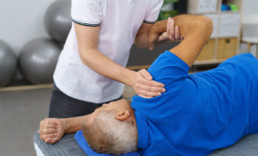You’ve heard your friends describe someone by saying, “He carries the world on his shoulders.” It’s a saying that derives from Greek mythology and it refers to Atlas, the Titan god who held the sky aloft. When the Titans were defeated by Zeus, Atlas was condemned to carry the heavens on his shoulders and he is often pictured as a man bending forward, holding the Earth on his back. Now, who wouldn’t have sore shoulders from such a challenge?
While you don’t literally carry the world on your own shoulders, figuratively, you may feel as if you do. Life is full of stress and challenges and our shoulders absorb much of that tension. In addition, our shoulders are the joints with the greatest range of motion and are ripe for injury. Luckily, there are ways to ease your physical burden.
How do you relieve shoulder pain?
Naturally, some sources of shoulder pain require more serious remedies than others, but all are treatable. There is no need to suffer unduly. The appropriate treatment for your shoulder pain depends on:
- Severity of the injury;
- Location and type of injury;
- How long ago it occurred;
- Your own age and general health; and
- Your usual activities.
If your shoulder pain is the result of an acute injury such as an automobile accident or a blow to the shoulder, don’t delay in seeking a medical evaluation and suggestions for appropriate treatment. Fractures need to be stabilized quickly so they can set properly.
Rest for a day or two and regular applications of ice to control inflammation and keep the pain in check are generally appropriate for all shoulder injuries. You may also want to take a non-steroidal anti-inflammatory device (NSAID), such as ibuprofen, to reduce the pain.
Physiotherapy
Your physician will undoubtedly suggest a visit to the physiotherapist once the pain and swelling have subsided a bit. A physiotherapist will assess the injury, its causes and the associated pain and will create a course of treatment. You can expect questions about the source and severity of your shoulder pain, as well as the factors that aggravate it or relieve it.
Your physiotherapist will also test your range of motion and shoulder strength before determining which exercises and other treatments will be most beneficial. Remedies such as moist heat and acupuncture are among the options available to supplement exercises.

The anatomy of the shoulder
Your shoulder is a ball and socket joint that consists of three major bones: the upper arm bone (the humerus), the collarbone (the clavicle) and the shoulder blade (the scapula), bound together by tendons, ligaments and muscles. With so many moving parts, it’s no wonder that shoulders are easily injured. In addition, the joint overlaying the shoulder, the acromioclavicular joint, is also subject to injury.
What causes shoulder pain?
Shoulder pain can result from chronic ailments, such as osteoarthritis, or from an injury to the joint or its surrounding parts. Common causes of shoulder pain include:
- Arthritis
- Strains from overexertion
- Tendinitis from overuse
- Pinched nerves
- Dislocation
- Fractures to the collarbone or upper arm
- Joint instability
- Frozen shoulder
- Pulled muscles (sprains) or injuries to the ligaments (strains)
- Damage to one of the surrounding tendons (torn rotator cuff)
- Poor sitting posture (hunching over a computer all day, for example)
Some of these injuries are acute and caused by trauma to the area. You may fall and land on your arm in an awkward position; you may twist or bend your shoulder abnormally, perhaps pitching in a pickup baseball game; or you may absorb a direct blow to the shoulder, falling on the stairs, for example.
In other cases, the injuries may be the result of overuse and sneak up on you. Overuse injuries result when too much stress is placed on the joint, through repetition of a motion or by overdoing an activity. Your tennis serve may put repeated stress on your shoulder until, finally, injury results.
In addition, there are seemingly benign sources of shoulder pain, including poor posture and muscle tension.
Can stress cause your shoulder to hurt? Yes, stress can accumulate in the shoulders as easily as it does in other joints.
Overuse injury symptoms
Naturally, if your shoulder injury is due to trauma, such as a tackle during a football game or a fall down the stairs, you’ll be able to identify the cause immediately. However, if your injury is due to overuse, these symptoms may be signs that you need treatment:
- Limits to your range of motion;
- Loss of strength in your shoulder;
- Shoulder pain and stiffness;
- Difficulty in doing everyday tasks, such as bathing, driving a car, dressing and sleeping comfortably; and/or
- Problems with accomplishing tasks that require you to put one arm behind your back, such as zipping a dress.
How to prevent shoulder pain
Shoulder problems can usually be repaired without surgery. Nonetheless, why endure them at all when you can take some simple steps to prevent them:
- Stay in shape: Eat a healthy diet and exercise regularly.
- Warm up before exercise: Cold muscles are more susceptible to injury.
- Watch your posture: Sit and stand erect. Get up from your desk every hour to move around and stretch.
- Lift properly: Don’t strain to reach items you need. Step stools were created to help you.
No matter whether your shoulder injury is minor or major, it will heal with proper treatment. There’s no need to live like Atlas for the rest of your life!
